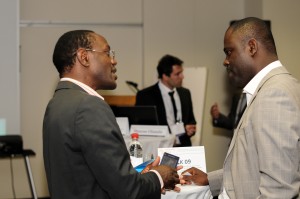What constitutes good connectivity? The answers to this question seem to be related to personal experience: dial-up users think that every other option is great, whereas ADSL users want cheaper, faster upload and download speeds. So we need to start with the premise that good connectivity is subject to the individual user’s experience, and this is by no measure an observation unique to South […]
Recent news
Seeds 2.0 to Modernise and Boost the Agricultural Sector
“Really? But what has the agricultural sector got to do with Web 2.0?” That was the sarcastic question I was asked one day when I was describing the Web 2.0 training that I provide to CTA (the Technical Centre for Agricultural and Rural Cooperation). It was an understandable question; on the one hand the Web 2.0 concept seemed to be a current reality reserved […]
African Vision
When we were building Teachers Media’s strategy for Africa, I decided that we should attend the Conference of Ministers of Education of the African Union (COMEDAF) in Abuja, Nigeria. At COMEDAF, many education ministers, passionate educators and decision makers decide the vision and focus for African education. On my way to Abuja, I landed in Lagos, not realising that the local and International airports […]
Managing a Critical Situation
“In rural South Africa, a man arrived at the local hospital with the classic symptoms of heart failure. All that was needed to confirm the diagnosis, and decide upon an appropriate treatment, was one test. The first attempt to carry out the test was foiled by broken equipment. When a replacement device was found the doctor on duty discovered it had run out of […]
It All Adds Up: Mobile Learning and Numeracy Education
According to the Education for All (EFA) goals, all children should achieve ‘recognised and measurable learning outcomes…especially in literacy, numeracy and essential life skills’ by 2015. While literacy has come a long way, numeracy has been largely neglected as a goal by the international education agenda so far. By grade four, many children worldwide do not master basic numeracy competencies such as measuring, estimating […]
“eLearning Africa has torch-lit the ICT & innovation capability in me”
eLearning Africa brings together 1,500 education and training professionals from all over the Continent and across all sectors. Every participant has their own story to tell of how they came to be involved in the world of technology-enhanced education and ultimately the eLearning Africa conference itself. In this edition of the newsletter we present the experiences of a first-time participant and speaker at eLearning […]
African Libraries in the Digital Age: “reaching outside their walls”
“I have always imagined Paradise as a kind of library”, mused the Argentine writer Jorge Louis Borges in 1960. Now, fifty years later, most of us are more likely to turn to the Internet than a librarian when seeking information. Archives of books, journals and articles are being digitised and uploaded on a wide scale; encyclopaedias and dictionaries are not only available free-of-charge online […]
The eLearning Africa Debate 2013: An invocation to innovation
As the 8th edition of eLearning Africa drew to a close on Friday evening, delegates gathered together for one last time for a spirited show of wit, cunning and intellectual gymnastics, as experts squared up to each other at the yearly eLearning Africa Debate. By Alicia Mitchell
La révolution numérique selon les Africains
Un rapport récent révèle que les ordinateurs et les téléphones portables sont désormais, et de loin, les nouveaux dispositifs d’apprentissage les plus populaires en Afrique. Les tablettes, quant à elles, accusent un retard malgré leur engouement, et ne sont utilisées régulièrement que par 20 % des professionnels de l’eLearning. Voici l’une des conclusions surprenantes du Rapport eLearning Africa 2013. Lancé aujourd’hui (jeudi) au Safari Conference […]
African Voices on the Digital Revolution
A new report shows that laptops and mobile phones are now far and away the most popular new learning devices in Africa – while, despite the hype, tablets are still lagging, only being used regularly by 20% of eLearning practitioners. This is just one of the surprising findings contained in the eLearning Africa Report 2013. Launched at eLearning Africa 2013 by the Namibian Minister […]




























